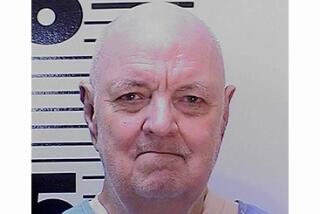High Court Upholds 2 More Death Penalties: Total Now 14 of 19
SAN FRANCISCO — The state Supreme Court upheld two death sentences Thursday, bringing to 14 the number of such penalties approved in the 19 capital cases the justices have decided since a conservative majority emerged on the court a year ago.
The justices, by a vote of 5 to 2, affirmed the death sentence rendered against Thomas Martin Thompson of Laguna Beach for the rape and murder of a 20-year-old Mission Viejo woman in 1981.
In a unanimous decision, the court upheld the death verdict returned against Alfred Dyer for the 1980 murders of two people in Oakland in a dispute over rings he believed were stolen from his fingers as he slept.
Death Penalty Vote
An Orange County Superior Court jury had voted to impose the death penalty on Thompson after only three hours of deliberation after he had been convicted in the stabbing death of Ginger Fleischli, whose body had been discovered in a shallow grave after her disappearance in September, 1981.
The prosecution charged that Thompson killed Fleischli to prevent her from reporting the rape to authorities and interfering with an illegal plan he and a fellow conspirator had developed to smuggle Vietnamese refugees out of Thailand.
A co-defendant in the case, David Leitch of Laguna Beach, was tried separately, found guilty of second-degree murder and sentenced to 15 years to life in 1985.
Arguments Rejected
The high court, in an opinion by Justice John A. Arguelles, rejected a series of contentions raised by Thompson in the automatic appeal of his conviction and death sentence.
Among other things, the majority refused to accept the defendant’s claim that the jury should not have been allowed to hear testimony by a jail informant that Thompson had asked the informant to kill Leitch and dispose of his car and body to make it appear that he had fled while free on bail.
The court said that while it was “disconcerting” for the prosecution to rely on the questionable testimony of such informants, the defense had received “wide latitude” to cross-examine the witnesses.
In any event, Arguelles wrote, the jury was the proper authority to weigh the credibility of witnesses. “Nothing indicates this jury was anything other than conscientious, analytical and competent in discharging its responsibility,” he said.
Testimony Cited
Justice Stanley Mosk, in a dissent joined by Justice Allen E. Broussard, said that while Thompson’s conviction should be upheld, the sentence of death should be overturned because of the use of the informant’s testimony about Thompson’s alleged solicitation of the murder of his co-defendant.
Mosk said he disagreed with the majority’s conclusion that such evidence had no effect on the outcome of the case.
“It appears to me reasonably possible that a jury, when considering the penalty, would give serious consideration to evidence tending to prove that while (Thompson) was awaiting trial for one murder, he at the same time was attempting to arrange still another murder,” Mosk wrote.
“This damaging evidence might reasonably convince the jurors that sparing the defendant’s life could well be dangerous to the lives of others, and thus tilt their decision toward the death penalty.”
More to Read
Sign up for Essential California
The most important California stories and recommendations in your inbox every morning.
You may occasionally receive promotional content from the Los Angeles Times.










